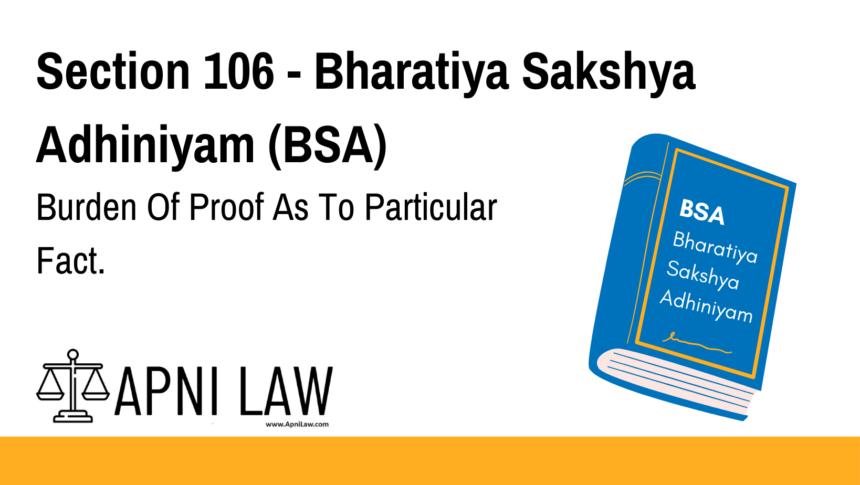Code: Section 106 Bharatiya Sakshya Adhiniyam, 2023
The burden of proof as to any particular fact lies on that person who wishes the
Court to believe in its existence, unless it is provided by any law that the proof of that fact
shall lie on any particular person.
Illustration.
A prosecutes B for theft, and wishes the Court to believe that B admitted the theft to
C. A must prove the admission. B wishes the Court to believe that, at the time in question,
he was elsewhere. He must prove it.
Explanation of Section 106 BSA
Section 106 of the Bharatiya Sakshya Adhiniyam, 2023 establishes a rule for determining the burden of proof concerning specific facts in a case. It states that:
- If a person wants the court to believe a particular fact, that person must prove it.
- However, if a law specifically places the burden on another person, then that legal provision will apply.
This section ensures that every party in a case bears the responsibility for proving the facts they rely upon. It reflects the principle of fairness and logical reasoning in the judicial process.
Key Principles:
- Whoever asserts a particular fact must prove it.
- This rule operates unless a law explicitly shifts the burden to another party.
- The section is neutral and applies equally to prosecution and defense.
Illustration
Let’s break down the official example:
- A prosecutes B for theft and wants the court to believe that B confessed to C.
→ A must prove that the confession was made. - B wants the court to believe that he was not at the scene of the crime (alibi).
→ B must prove the alibi.
This shows how the burden shifts depending on who asserts the fact — whether it’s a confession or a defense like an alibi.
Common Questions and Answers on Section 106 BSA
- What is the difference between general burden of proof and burden of proof for a particular fact?
- General burden of proof (Section 104 and 105) refers to the overall responsibility to prove a case. Section 106 deals with specific facts that a party wants the court to accept as true.
- Can the burden of proof shift between parties in a case?
- Yes. If one party asserts a specific fact (e.g., alibi, confession, exception), they bear the burden of proving it, unless a law places the burden elsewhere.
- What happens if neither party proves a particular fact?
- If a party fails to prove the fact they assert, the court may not accept that fact, which can result in the failure of their claim or defense.
- Is Section 106 used in criminal cases only?
- No. It applies in both civil and criminal proceedings, wherever specific facts are asserted.
- What if a particular law says someone else must prove a fact?
- That legal provision will override Section 106, as this section is subject to other specific legal rules.
Conclusion
Section 106 of the Bharatiya Sakshya Adhiniyam, 2023 provides a fair and logical approach to assigning responsibility for proving specific facts in court. It ensures that anyone who asks the court to believe something must be prepared to substantiate it with evidence, unless a law says otherwise.
Understanding this rule is essential for both prosecution and defense, as it governs how detailed facts — like confessions, alibis, or exceptions — must be proved.
For more expert insights on Indian evidence law and legal updates, visit ApniLaw.








